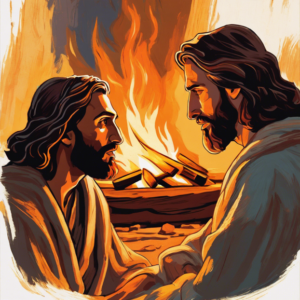The Story Shared in John Chapter 21
Click Here to Listen to the song
In this chapter, we discover a powerful moment when Jesus appeared to some of His disciples after His resurrection. This significant event took place by the Sea of Tiberias, commonly referred to as the Sea of Galilee.
After a long night of fishing, during which they caught nothing, Peter, who was a natural leader, suggested that they go out to fish. Even though they had worked hard all night, they were unsuccessful. As dawn broke, Jesus stood on the shore, but the disciples failed to recognize Him. He instructed them to cast their nets on the right side of the boat, and they were amazed when they caught an enormous number of fish—153 in total! Upon realizing that it was Jesus, Peter leapt into the water, swimming eagerly to Him, while the other disciples followed in the boat, bringing along their impressive catch. When they arrived at the shore, Jesus had prepared breakfast for them, marking a joyous reunion among friends.
A Profound Conversation with Jesus
Once they had finished eating, Jesus turned to Simon Peter and called him by name, asking, “Do you love me more than these?” Peter responded, “Yes, Lord; you know I love you.” This exchange occurred three times, emphasizing the deep significance of Peter’s love and loyalty to Jesus. Each time Jesus urged Peter to “Feed my lambs,” highlighting the responsibility He was entrusting to Peter.
The Need for Repentance and Faith
It’s crucial to remember that Peter had faced his own moments of weakness; he had previously denied knowing Jesus. Yet, through heartfelt repentance and unwavering faith, he found a path to restoration. Before this pivotal moment, Peter had boldly proclaimed he would never deny Jesus, but when the pressure mounted, he faltered. The realization of his failure struck him deeply, leading him to weep bitterly.
Gleaning Wisdom from Failure
Peter’s experiences serve as a profound reminder that we all encounter failures in our lives. However, God’s grace offers us forgiveness and a chance for renewal. Just like Peter, we can glean valuable lessons from our past mistakes. Jesus’s repeated questions to Peter regarding his love serve as a poignant reminder that true devotion to Christ is revealed through our actions, especially in how we nurture and care for others.
Illustrations of Restoration
The Bible is filled with stories of individuals who, despite their failures, experienced restoration:
- David: Committed serious wrongs but was forgiven after a sincere repentance.
- Jonah: Initially ran away from God’s call but received a second chance to fulfill his mission.
- Moses: After fleeing from his wrongdoing, he was chosen by God to lead the Israelites out of bondage.
- Samson: Although he made significant mistakes, he regained his strength through God’s restoration.
- John Mark: He abandoned Paul during a journey but later reconciled and became valuable in ministry.
- Thomas: Known for his doubts, he was reassured and restored in faith when he encountered the risen Jesus.
- Elijah: Faced great challenges yet was taken up into heaven in a remarkable manner.
The Depth of God’s Unconditional Love
God’s love and forgiveness have no limits. As Peter discovered, our failures do not define our identities; instead, they can serve as a backdrop against which God’s grace shines brightly. The dialogue between Jesus and Peter illustrates the importance of having a sincere and profound love for Christ—a love that transcends all other relationships and attachments.
Conclusion
Ultimately, Peter’s past missteps did not hinder him from fulfilling God’s divine purpose. Rather, those failures highlighted the incredible grace that is available to everyone. Just as Jesus encouraged Peter to embrace His love and serve others, we are similarly called to rise to this challenge. Let us commit ourselves to loving Christ above all else and caring for those around us, knowing that we are forgiven and empowered to carry out God’s purpose in our lives. Amen.

